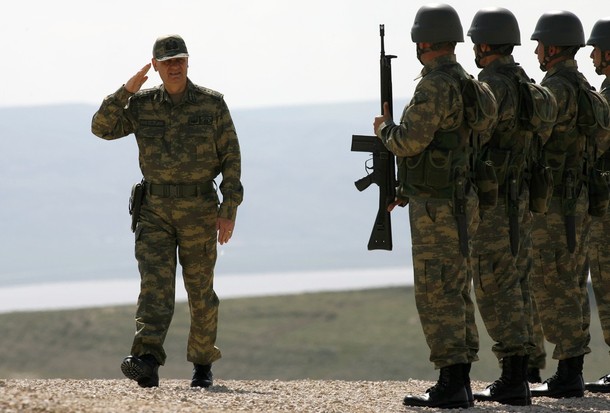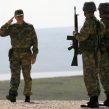
Turkish General Staff Accused of Seeking to Undermine the Government
Publication: Eurasia Daily Monitor Volume: 6 Issue: 114
By:

On June 12, the liberal left Taraf daily triggered a political crisis in Ankara. Taraf claimed to have uncovered a four-page unclassified document, detailing an alleged action plan for the military to combat the "reactionary activities" against secularism. It was allegedly prepared by a colonel from the operations department at the headquarters of the chief of the general staff. This signals a new confrontation between the Turkish military and the governing Justice and Development Party (AKP).
"The Action Plan against Reactionaries (Irtica)," allegedly prepared in April, was seized during a police search in the offices of Serdar Ozturk, the lawyer representing retired Colonel Levent Goktas -both arrested as part of the Ergenekon investigation. The document defines the AKP and the Gulen movement as threats to the secular order in Turkey, and accuses them of seeking to establish an Islamic state. The plan also criticizes the Ergenekon investigation, describing it as an attempt by Islamic groups to undermine the state and defame military personnel. The action plan proposed various measures aimed at "revealing the hidden agenda" of the AKP and Gulen movement, and undermining their public support. It also contemplates a psychological warfare campaign to promote widespread suspicion against these groups -even amongst pious Muslims- and exaggerate the threat they pose. Moreover, the plan suggests psychological operations against members of the Turkish armed forces suspected of being affiliated to Islamic groups. Furthermore, such propaganda seeks to discredit the Ergenekon investigation and mobilize public support for any military personnel implicated (Taraf, June 12).
Taraf’s story has proven to be controversial in Ankara. The office of the chief of the general staff announced that the military court had banned any further media coverage of the story. The statement described the alleged action plan as related to national security, public order and public security, and banned any publication of its contents. The military prosecutor launched an investigation into the source of the leak and the dissemination of the document. When questioned about these developments during his weekly press briefing, the military’s spokesman Metin Gurak said that the military prosecutor will investigate all aspects of the story. Nonetheless, he declined to explain whether the investigation would be launched against "the existence of such a document or how it was leaked" (Anadolu Ajansi, June 12).
Despite the military’s ban on publicizing the document, several media outlets close to the Gulen movement and the AKP government chose to ignore it. The Zaman daily ran a counter campaign against the military’s attempts to ban media coverage. Zaman and its sister daily Today’s Zaman, covered the development intensively, and portrayed the document as representing a serious threat to Turkish democracy and supplying more evidence of the ongoing influence of the military within the political system. They used this incident to make two related points. First, it sought to mobilize the government to revitalize its stalled domestic reforms aimed at boosting democratization and civilian control over the armed forces. Second, it called on the military leadership, particularly the Chief of the General Staff General Ilker Basbug, to demonstrate commitment to democracy by acting decisively over this issue. Equally, it demanded clarification on whether the military as an institution or its commissioned officers are implicated in such activities against the civil authority (Zaman, Today’s Zaman, June 13, 14, 15).
Liberal columnists in other newspapers emphasized similar arguments, noting that Turkey faces ongoing challenges in order to curtail the military’s political influence (Milliyet, Radikal, June 13). Others largely restricted their reporting to the military’s ban on the Taraf story. Hurriyet quoted Serdar Ozturk’s lawyer, who claimed that the document was placed in his client’s office by the pro-Gulen movement clique within the Turkish police. He said they would press charges against the police and the prosecutors for leaking the document (Hurriyet, June 13).
Prime Minister Recep Tayyip Erdogan reacted angrily to the document. On June 13, while addressing a party congress in Kars, he emphasized his determination to protect democracy and maintained that the AKP is the main guarantor of Turkey’s constitutional order (Anadolu Ajansi, June 13). Speaking at another party congress on June 14 in Sanliurfa, he reiterated this commitment, and promised to combat any plots against democracy. Erdogan contextualized the document, however, as part of other efforts to weaken the AKP, and argued that "in a democratic environment we cannot remain a spectator to this illegal process against the AKP. We are investigating [the plots against the AKP] and will take legal action if necessary" (www.haberturk.com, June 14).
Taraf has run controversial stories by publishing unclassified military documents, since it was first published by a group of liberal journalists in 2007 -exposing either the activities of groups within the military seeking to topple the government, or the flaws in the Turkish army’s campaign against the PKK (EDM, July 18, 2008; Terrorism Focus, October 30, 2008). Basbug has publicly accused Taraf in the past of conducting a defamation campaign against the military. Erdogan also joined Basbug in lambasting Taraf, but this did not change its publication policy (www.haber7.com, October 17, 2008).
If the latest revelation in Taraf proves to be true, it is likely to have significant repercussions for the current balance of power in Ankara. Erdogan and Basbug apparently reached a common understanding on major political issues, such as the Ergenekon investigation and the management of the Kurdish question. They have established close communication channels to exchange opinions. Erdogan did not object to Basbug’s controversial efforts to reassert a role for the military within Turkish politics (EDM, April 15), while Basbug permitted the trial of military officers in the Ergenekon case. Their management of the claims that the military headquarters might be involved in a conspiracy against the government could force them to redefine their working relationship, with significant implications for the future of Turkish civil-military affairs.




